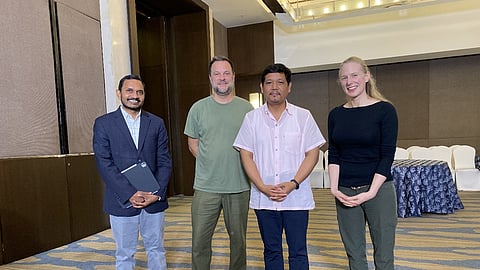
- Home
- Live Blog
- Breaking News
- Top Headlines
- Cities
- NE News
- Sentinel Media
- Sports
- Education
- Jobs

GUWAHATI: Meghalaya is no longer an exception in reducing maternal deaths. Its success story is now being 'studied as a case' at Harvard University.
The production team from Harvard took a shot at this journey from October 27 to November 1, 2024, by discussing it with key leaders, healthcare professionals, and community members. According to the State Capability Enhancement Project, the team caught some golden moments from figures like Chief Minister Conrad K. Sangma and Principal Secretary Sampath Kumar among others.
The case study will be featured in Harvard's Adaptive Leadership online course, designed to teach leaders how to tackle complex challenges by internalizing the concept of a distinction between technical problems and adaptive challenges, which involve innovation, working together, and managing uncertainty.
The Harvard team, along with officials of the office of the Development Commissioner of Meghalaya, visited a remote village, Wahlyngdoh, and Lynching, under the Mawlat Sub-Centre, where there have been near-zero deaths of both mothers and infants in the last year, thanks to initiatives by community-led healthcare.
SCEP, initiated in Meghalaya, has focused its strategies on developing purpose-driven collaboration among state agencies. Its mission is to change approaches toward government performance improvement in an organization that boasts a high-performing and motivated workforce. The 50% reduction in maternal deaths is the prime example of such an approach.
Its data-driven, community-based health strategies have been lauded as a model for public health. A state once wracked by poor maternal mortality profiles moved to adopt novel, evidence-based policies that empower local communities. Adaptive leadership and cross-sector collaboration thus prove effective tools for success.
Some have also been able to focus on internships in the health systems in Meghalaya. For example, Priya Sarma is a summer from the Harvard Chan School of Public Health whose interest was in strengthening health systems and women's leadership. She said in reflection: "Empowering women leads to improved health and education outcomes for both women and children.".
Laura Martinez Rodriguez, the other Harvard intern, worked closely with the SCEP team to develop strategies for projects working on maternal and child health, early childhood development, women's leadership, and natural resource management.
Sampath Kumar, Principal Secretary for Health, spoke of the efforts taken by the state to cut down on further maternal deaths. At review meetings held every week and digging deep into root causes, issues mothers in remote areas have faced are identified, and it has targeted support.
The decentralized health system has encouraged local accountability and pride, permitting health teams to look after the needs directly of their community. Such a structure has been pivotal to achieving mother-and-child health improvements in the state.
ALSO WATCH: